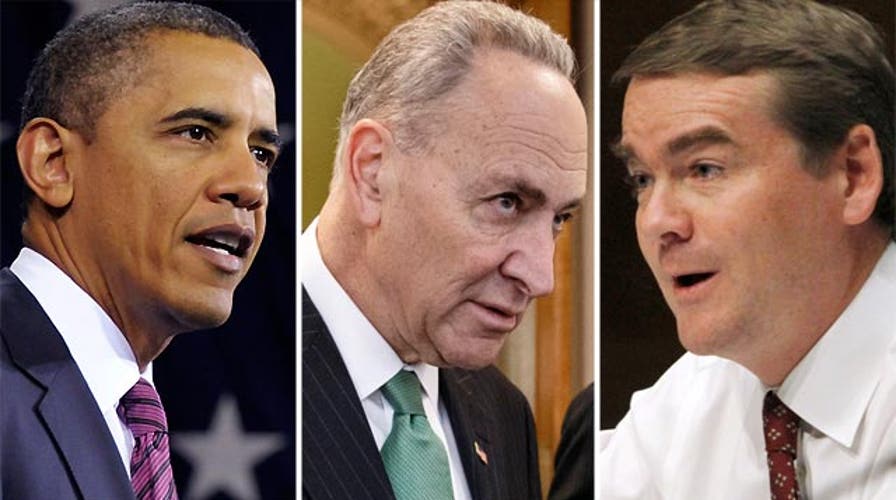Obama vs. Democrats over future of Medicare Advantage?
Reaction to president's planned cuts to program spark debate
WASHINGTON – The Obama administration announced Friday cuts were on the table next year for Medicare Advantage, giving new ammunition to critics of the president’s health care law and disappointing some Democrats.
The politically dicey move affecting a private insurance alternative highly popular with seniors immediately touched off an election-year fight.
Sen. John Thune, R-S.D., chairman of the Senate Republican Conference, said, “Every senator who voted for this train wreck owes America’s seniors an explanation for these Medicare cuts, which are already resulting in higher costs and reduced access to the doctors they had and liked.”
Senate Republican Leader Mitch McConnell of Kentucky also attacked the proposed cuts, saying, “the best solution would be to recognize ObamaCare for the historic mistake that it is, repeal it, and replace it with commonsense reforms that will protect America’s seniors and families from the seemingly never-ending consequences of this terrible law.”
Last week, 40 senators from both parties, including Democrat Chuck Schumer of New York and Michael Bennet of Colorado, chair of the Democratic Senatorial campaign committee, wrote the administration urging no more cuts, calling the program, “a great success” and saying cuts “create disruption and confusion.”
Late Friday after financial markets closed, Medicare issued a 148-page assessment of cost factors for the private plans next year. It included multiple variables, some moving in different directions, but analyst Matthew Eyles of Avalere Health estimated it would translate to a cut of 1.9 percent for 2015, a figure also cited by congressional staffers briefed on the proposal.
"There's nothing to like here if you're one of the plans," said Eyles.
Administration officials say the plans don't need to be paid as much to turn a profit, because the growth of health care spending has slowed dramatically. They see the cuts as a dividend for taxpayers.
But the political clout of the plans is growing as seniors flock to them seeking better health care value. Medicare Advantage plans now serve nearly 16 million people, or about 30 percent of Medicare beneficiaries. They can offer lower out-of-pocket costs and broader benefits than traditional Medicare, but often restrict choice.
Insurers say they will be forced to pass on higher costs to seniors or cut benefits if their rates are reduced, and some plans may drop out altogether. The impact could vary significantly around the country.
The industry says the cuts come as Medicare Advantage reductions programmed under the health care law are ramping up. The law sought to compensate for prior years in which the plans were overpaid. But it also includes a new tax on insurers, so industry officials fear the combined impact will be much higher.
The largest insurer trade group, America's Health Insurance Plans, is sparing no effort to head off cuts, with an extensive advertising and lobbying campaign.
It has won the support of 40 senators from both parties who, in a Feb. 14 letter, called on the administration to essentially hold Medicare Advantage rates steady. Among the signers were six Democratic senators in contested races whose outcome will determine whether Obama faces a Congress next year that's completely controlled by Republicans.
Final rates won't be released until April 7, so the lobbying will get even more intense. In prior years, Medicare has sometimes pulled back from proposed cuts.
Friday's announcement will help the government decide basic rates for the Medicare Advantage plans. But the actual change individual plans and customers eventually see will vary, depending on factors like a plan's quality rating or where the plan is located.
The plans have become a key source of revenue growth for insurers who sell and administer the subsidized coverage. They offer basic Medicare coverage topped with extras like vision or dental coverage or premiums lower than standard Medicare rates. There are hundreds of different plans around the country, each with its own set of variables like different deductibles, premiums and co-insurance.
UnitedHealth Group Inc. and Humana Inc. are the two largest Medicare Advantage providers. Health insurance stocks that soared in 2013 slipped at the start of this year after Humana Inc., the second-largest in the market, said rate cuts could be deeper than expected.
Fox News’ Jim Angle and The Associated Press contributed to this report





